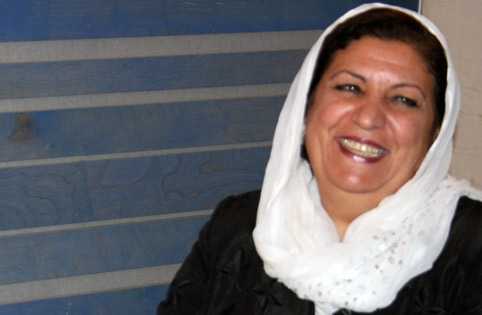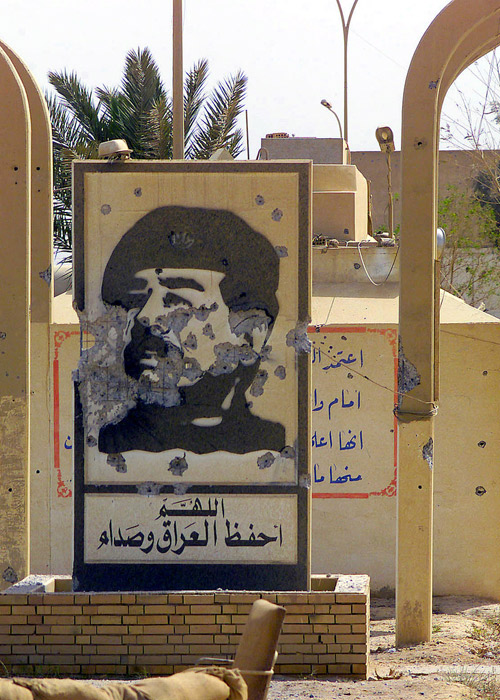Reflections of Iraq
Rajaa Al-Khuzai Fights for Iraqi Women’s Rights
"As Iraqis, we never forget that we are a civilization and that our civilization was destroyed many times during our history."
Dr. Rajaa Al-Khuzai was born in the small town of Diwaniyah in the south central region of Iraq. Raised in a large middle-class family of five brothers and three sisters, Al-Khuzai had a liberal upbringing. "My father, a schoolteacher, was the most liberal in my hometown. I never saw my father or my mother discriminate between boys and girls. They treated us equally. Sometimes we thought that my father preferred girls more than boys."
Al-Khuzai was never forced to wear the abaya, the traditional long black body covering for women. Her parents encouraged her to pursue an education like her brothers. After graduating high school, Al Khuzai traveled to Baghdad where she attended medical school for six years. Her graduating class consisted of 180 women and 180 men who all worked collaboratively toward their educations.
But it was not unusual for women in Al-Khuzai's generation, and even the previous one, to have a university-level education. For many years, Iraq was a modernizing and progressively prosperous society. Women were educated, professional, and politically organized.
According to Al-Khuzai, life in Iraq was peaceful and egalitarian. "We had a happy life. People were very generous even if they were poor. I never felt a sense of fear even when I was a child. I used to play with our neighbors children and it was very normal for us to go to each other's houses. But now things have changed completely."
"Today the threat of violence is constant and there are no services. There is now no electricity, no clean water. Children are all suffering. And I felt the suffering is on the woman's shoulders."
First-Person Testimony of Iraq's Wars
"There's nothing like peace and you can never imagine how important peace is for life until you lose it."
In 1977, Rajaa Al-Khuzai was appointed to the head of the maternity department in Baghdad. Since then, she has delivered over a thousand babies, many of whom were named after her or her daughters. When the Iran-Iraq War began in 1981, Al-Khuzai, like many other Iraqi women, was forced to take over men's roles in the local communities because "there was no choice."
"My husband is a surgeon," she recounts. "They needed surgeons to attend to the army. So he went and I stayed at home with the kids. I played the role of the mother, father and the doctor. For example, I took the car to get repairs and changed oil for the car."
"Most of the Iraqi women felt that day by day, year by year, we were becoming stronger. Eight years is a long time and it changed every aspect of our personality, and even, our attitude. This role didn't end after the war with Iran."
Dedicating a Lifetime to Iraqi Women
"Politics is to learn how to help people. This is my belief."
Immediately following the Iraq-Iran War, women were hit by the social and economic impact of the invasion of Kuwait and the sanctions of the first Gulf War in 1990. As a mother and a doctor, Al-Khuzai was very resourceful as the primary caretaker for her family and a healer for her community. But the double-duty of mother and doctor did not come easy. Lack of electricity, made communications with her family difficult. As hundreds of doctors fled the region, she stayed to perform emergency cesarean sections in the dark.
When Saddam Hussein's government was overthrown, Al-Khuzai founded the Iraqi Widows Organization. As the first woman to establish a microcredit system for women in Iraq, Al Khuzai has provided thousands of job opportunities to the two million Iraqi war widows who have suffered economically and emotionally.
When she was appointed into the Iraqi Governing Council, she was one of three women. Her motivations for accepting the position were to dedicate her efforts beyond mothers and widows to all the women and people of Iraq. The position has come with major risks. In 2004, Al-Khuzai's colleague, Dr. Aqila al-Hasimi was assassinated in a car bomb near her doorstep. Because of the dangers, Al-Khuzai's husband has closed his clinic and she and her children are always accompanied by their 30 bodyguards. Al-Khuzai is undaunted.
"I have fought fights with men to get women's rights. I receive death threats from the party which my colleagues belong to. I didn't care because I felt I'm moving in the right direction and if I die by being killed or assassinated while I'm supporting women's rights, this will be an honor for me."
Although she says the situation for women in Iraq is grim, Al-Khuzai is hopeful:
"This is the time for a woman to move. We have the background. It's our history. Women are strong. They can push themselves and they can make changes. And you know, without women, I don't think there will be change happening in Iraq. I think women, if given the chance, can change the world."



